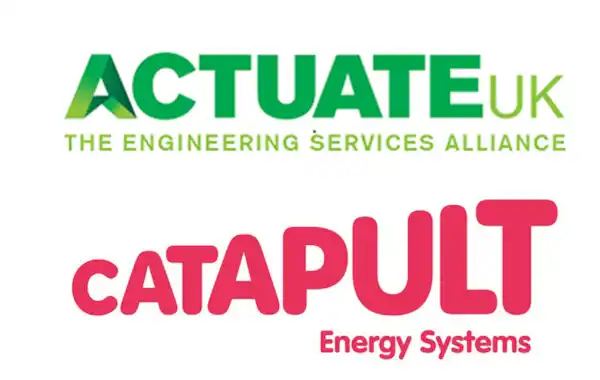15 March 2022
|
Engineering services alliance Actuate UK is working with Energy Systems Catapult (ESC) on a strategy to boost the creation of a skilled workforce that will play a central role in reducing emissions from the built environment and deliver on the government carbon targets.
The built environment is responsible for more than 40% of all carbon emissions and skills shortages in key engineering professions can threaten to derail the UK’s plans for decarbonising buildings and preparing the UK for a net zero economy. Moreover, the net zero challenge will require the sector to look to people with IT/digital, creative, energy systems, and Artificial Intelligence skills, as well as more ‘traditional’ engineering.
These are the issues to be tackled by the new strategic research project, funded by the Engineering Services Training Trust Ltd (ESTTL), with the outcomes to be shared with partner industry organisations in the umbrella body Actuate UK so the improved understanding and training innovations can benefit the whole engineering services sector. The research will also seek to quantify the benefits to business from having well-trained, competent people, and the business case for companies to be involved in skills development.
ESC is an independent, not for profit, centre of excellence for energy systems innovation and transformation for net zero. Director Richard Halsey, said: “We’re embarking on an in-depth study of the built environment sector, aiming to take a once in a generation opportunity to produce ‘a robust strategy’ to transform the culture to encourage upskilling and unleash innovation.
“Net zero buildings need to work for the people who use them…that won’t happen unless the workforce knows how to plan, design and deliver to meet those needs and can do so to the pace and scale needed to meet the challenge of climate change.”
Helen Yeulet, director of training and skills at the Building Engineering Services Association (BESA), who also leads the Actuate UK Skills Group, will be working with ESC and industry stakeholders on this project. She said: “The net zero agenda is already presenting a range of new challenges to our members and those of our partners in Actuate UK. To remain at the heart of the net zero discussion we must ensure we have a suitably trained workforce with a range of new skills to go with the technical and process innovations our sector has already developed.
“Employers will need to recruit from a much wider demographic than we do currently – to meet our responsibilities and take advantage of the huge business opportunities. Our work with the ESC will help to clarify what strategies and innovations we need to make progress.”
Andrew Eldred, director of workforce and public affairs at ECA, one of the Actuate UK members, added: “Tens of thousands of engineering services workers already possess the core competences required to deliver net zero. But, the sector’s recruitment of apprentices and others, including career changers, needs to grow substantially. We also require more accessible, high-quality upskilling training for net zero.”
More about the project
The ESC has been working on understanding the skills needed to address the transition to net zero for more than two years. It has reviewed the work of the industry and of academics, and has had regular communication with the government and the Institute for Apprenticeships and Technical Education. This has allowed it to develop a comprehensive picture of the challenges, and to better understand the competencies required.
It aims to bring all this knowledge to bear on this project and has set in motion a process of first defining the causes of the problem and then working with stakeholders to trial potential solutions. Key considerations include securing the buy-in of stakeholders by ensuring the commercial and technical feasibility of its ideas leading to better training and recruitment outcomes.
If you would be willing to support the future skills development of the industry by helping with this important research, please fill out this short contact form. The ESC will then be in touch and all responses will be anonymous unless otherwise agreed.








